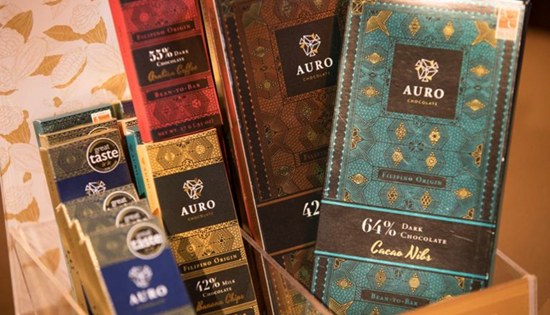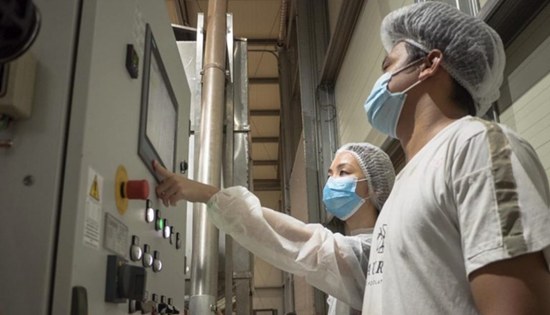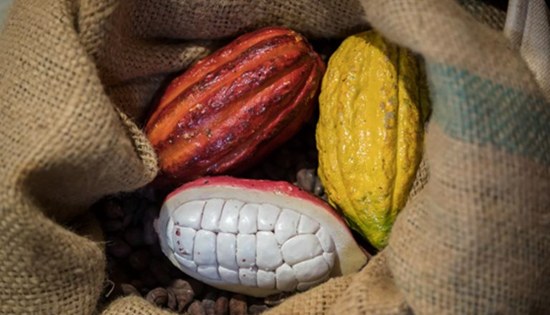Bean There, Done
That: Exporting to the European Union
|

AURO
chocolates, a Filipino company, is one of currently, only 24
companies in the country who are able to export products to the
European Union tariff-free under the EU’s Generalized System of
Preferences Plus (GSP+). |
Philippine chocolate firm
exports to the EU
By
DTI-KMIS Information
and Creative Service Division
January 16, 2023
New beginnings
It was in 2013, while finishing her university degree in Chicago,
that Kelly Go got a taste of an American craft chocolate using
Philippine-origin cacao.
From this point, her career aspirations became clearer. After
graduation, she decided to learn more about this craft by enrolling
in Le Cordon Bleu in Paris for a Diploma in Culinary Arts. This
training further enhanced her knowledge and skills about the food
business.
The love for food, culture, and chocolate directed her destiny in
Germany where she deepened her expertise in industrial chocolate
production.
“We saw the potential of elevating the fine chocolate market in the
Philippines and an opportunity to pursue our shared dream to move
back home and contribute,” Kelly shared.
Responsible production
Their company, Auro Chocolate, was eventually launched in 2017 as a
tree-to-bar chocolate brand and social enterprise introducing
community development programs and premiums above commodity price
for supporting farmers.
|

Kelly
Go, co-founder and manager of AURO Chocolate, talks with
operators of the grinding machine at the AURO chocolate
plant in Calamba, Laguna, in the Philippines. AURO Chocolate
benefitted from the EU’s GSP+ programme which facilitates
the entry of certain products tariff- free into Europe. |
With all beans directly sourced, Auro is promoting sustainability by
working directly with local farmers to cultivating fine cacao beans,
improving ingredients, and expanding retail products with unique and
bold tropical flavours, such as dried mango.
From a team of 20 staff, it has grown to over 100 employees working
towards the export of its products to the European Union (EU) and
other countries since 2018.
We involve ourselves in every step of the process by consistently
working with our partner farmers to enable them to produce fine
quality cacao beans that meet international quality standards,”
Kelly added.
Breakthrough
There were challenges to be hurdled before successful exports to EU
could materialize.
“At selling events, people would question the quality of our
products as chocolates from the Philippines are unheard of,” Kelly
said.
To win the trust of consumers regarding chocolate products grown and
made in the Philippines, Kelly must be abreast of mandatory
procedural requirements.
The Philippine Department of Trade and Industry (DTI) – Export
Marketing Bureau (EMB) assisted Auro in completing the mandatory
regulatory requirements for exporting in EU. The Centre for
International Trade Expositions and Missions (CITEM) further
supported the company in organizing country booths in key
international trade fairs such as Salon du Chocolat in France.
The initiatives worked wonders for generating interest in Auro’s
fine cacao.
A plus for the business: GSP+
Sales have increased by almost 200% since the Covid pandemic. Auro
is directly exporting to more than 15 countries with over 40
European chocolate makers using the company’s fine cacao beans to
make Philippine-origin chocolate.
Kelly was delighted to learn that chocolatiers in the EU countries
were using her company’s chocolate products. Being able to export to
the EU means that Philippine cacao can compete globally with other
well-known chocolate brands.

The EU’s Generalized Scheme of Preferences (GSP+) removes import
duties from products coming into the EU market from developing
countries, thus, Kelly was able to competitively price her products
vis-à-vis other brands.
“Our chocolate bars are doing well due to GSP+, which serves as a
gateway support to the EU market,” Kelly added.
Kelly is proud of her products being able to stand side-by-side with
other internationally known brands, allowing her company to continue
to grow business with their EU partners.
Gaining together
The resultant increase in sales has benefited Kelly, together with
those who work for her company.
“Thanks to the GSP+ status, we have become part of the international
cacao beans market, which led to an increase in our sales. This
means there is a growing demand for our partner farming community’s
beans, thus generating more income for them, while providing a
stable market for their cacao.”
Moving Forward
Auro chocolates is ready to set higher standards of achievement
under Kelly’s leadership:
“We have exciting plans. On the farm side, we are to launch more
community initiatives that are interwoven with our current cacao
program. We are also expanding our sourcing to introduce new,
exciting origins of chocolates. Shifting to more environmentally
friendly practices and materials across the supply chain is also on
the cards.”
She leaves an inspiring message for aspiring exporters from the
Philippines: “Do not feel intimidated when trying to apply for GSP+.
DTI is there to assist you throughout the application and help make
your brand marketable. It’s also a great opportunity for your
products to be introduced and grow in the EU Market.”